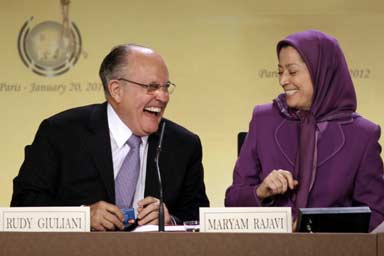 Emma Ashford points out some of the dangers of making policy with the guidance of self-interested exiles:
Emma Ashford points out some of the dangers of making policy with the guidance of self-interested exiles:
Policymakers in Washington are not blameless in this. A recent invitation by Congress to the Mujahedeen-e-Khalq (MEK), an Iranian opposition group, to testify before the House Subcommittee on Terrorism on issues relating to Iran and ISIS highlights how little scrutiny such groups sometimes face. Though certainly a vocal opponent of the regime in Tehran, MEK was only removed by the State Department from the list of foreign terrorist organizations in 2012, after heavily lobbying Congress. The group is communist and is often described as a cult. It is so extreme and so unrepresentative of the Iranian opposition in general that other regional experts testifying before Congress refused to appear on the same panel.
Ashford is right about all of this, and she had more to say along these lines in her excellent presentation at our conference in November. I would just add that the failure of policymakers goes beyond the lack of scrutiny applied to exile groups and individuals. Many policymakers are so preoccupied with hostility towards a certain regime that they will be go out of their way to find and promote the exiles that share their position, and they will do so knowing that the exiles aren’t what they claim to be. They will then boast that a position held by a few Westerners and an extremely unrepresentative exile group represents “the will” of the nation in question. The support of the exiles “legitimizes” the hawks’ desire for regime change by providing “evidence” that U.S. interference will be welcomed (useful for P.R. purposes if for nothing else), and the hawks’ backing gives the exiles a stamp of approval in Washington.
The ongoing rehabilitation of the MEK is a good example of this. Most Iranians in Iran and around the world detest the MEK for good reason, but to listen to their many fans in and out of government one would think that they area democratic government-in-waiting and that cult leader Maryam Rajavi is Liberty incarnate. That allows many Iran hawks to align themselves openly with a group that is rejected by Iranians everywhere while presenting themselves as champions of the “Iranian people” against their government. The views and preferences of the people in the other country are of no concern for the hawks except insofar as they can be misrepresented to support their preferred policy. The exiles pretend to speak for their country, and their patrons here pretend to believe them. Maybe a few are genuinely gullible enough to believe that a totalitarian cult is Iran’s real “secular, democratic opposition,” but most can’t be that clueless and are cynically indulging a horrible organization for their own reasons.
Something similar happens with political oppositions in other countries that don’t have much representation in Washington. Instead of accepting the promises of exiles, many interventionists will claim to know the goals of a foreign opposition movement because those happen to be their goals. They will cite the opposition’s imaginary preferences in our policy debates to insist that the U.S. ought to be doing what they claim the opposition wants. Iran hawks adopted the Green movement protests because they wrongly saw them as an opportunity to destabilize and even topple the regime, and they faulted Obama for “missing” that opportunity by not “doing more” to support them. It didn’t matter to them that most protesters didn’t want U.S. help, and it also didn’t matter that the protesters weren’t seeking regime change. Iran hawks deemed the protests worthy of U.S. support in large part because they perceived them to have the potential to bring down the regime, and once it became clear that this wasn’t going to happen they lost interest in the Iranian opposition until it was time to draft them into the campaign against the nuclear deal very much against their will.
In all of this, U.S. interests are entirely neglected, and more often than not the interests of the exiles’ country are also ignored, and both countries end up being ill-served by the ambitions of exiles and the delusions of hawks.
